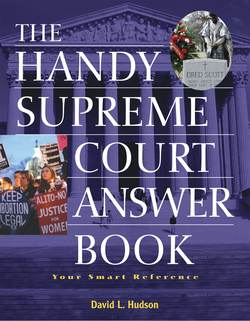Читать книгу The Handy Supreme Court Answer Book - David L Hudson - Страница 192
На сайте Литреса книга снята с продажи.
In what case did the justices decline to review pension benefits of soldiers?
ОглавлениеThe U.S. Supreme Court first examined this question in Hayburn’s Case (1792) and then in other cases collectively called the Invalid Pension Act cases. Congress had passed a law that provided that federal judges would review disability pension claims by soldiers and settlement claims of dead soldiers’ wives and orphans. One of these individuals was veteran William Hayburn. The law also provided that the judges’ decisions would be reviewed by the secretary of war. A group of federal judges, including five U.S. Supreme Court justices, wrote letters to President George Washington, declining the appointments because they believed it violated separation of powers principles. To the justices, it was inconsistent with separation of powers principles to have their decisions reviewed by an executive branch official.
The three-judge circuit court for the district of New York, which included Chief Justice John Jay and Justice William Cushing, issued an opinion to President Washington, explaining their opposition to the law. “That neither the legislative nor the executive branches, can constitutionally assign to the judicial any duties, but such as are properly judicial, and to be performed in a judicial matter,” they wrote.
The three-judge circuit court for the district of Pennsylvania, which included Justices James Wilson and John Blair, wrote a letter to President Washington. They wrote that the law was “radically inconsistent with the independence of that judicial power which is vested in the courts; and consequently, with that important principle which is so strictly observed by the constitution of the United States.”
Finally, the two-judge circuit court for the district of North Carolina, which included Justice James Iredell, also objected to the practice by letter to President Washington. The judges noted that the law “subjects the decision of the court to a mode of revision, which we consider to be unwarranted by the constitution.” Congress responded to Hayburn’s Case by passing a new law dealing with veterans’ pensions.
